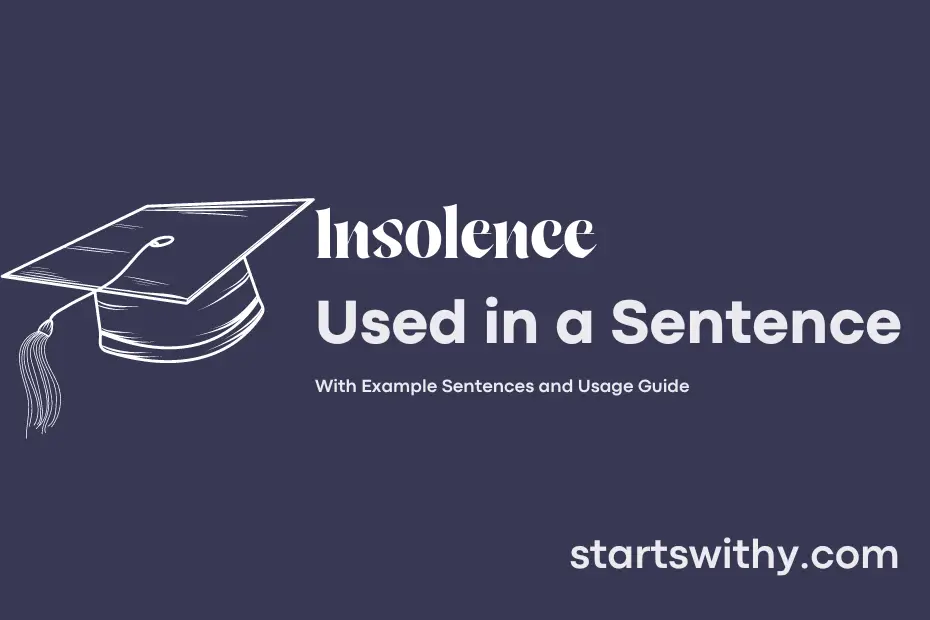Have you ever encountered a display of insolence in a conversation or witnessed a disrespectful attitude towards authority? Insolence refers to the act of showing a lack of respect or rudeness towards others, often characterized by defiance or arrogance. It can manifest itself in various forms, from subtle gestures to outright defiance.
Whether it’s a sarcastic remark, a dismissive tone, or a blatant disregard for rules or boundaries, insolence can create tension and conflict in interpersonal relationships. Recognizing the signs of insolence and addressing them effectively is crucial in maintaining a harmonious and respectful environment in both personal and professional settings.
7 Examples Of Insolence Used In a Sentence For Kids
- Insolence means being rude and disrespectful.
- It is not nice to show insolence to others.
- Let’s always remember to speak kindly and not with insolence.
- We should treat everyone with respect and not insolence.
- Showing insolence can hurt someone’s feelings.
- It is important to use kind words and not insolence.
- Remember to always be polite and avoid insolence.
14 Sentences with Insolence Examples
- Insolence is not tolerated in the classroom, no matter how frustrated you may be with the professor.
- His constant insolence towards his classmates led to a formal complaint being filed against him.
- The student’s constant insolence towards the institution’s rules resulted in his suspension.
- It is important to address any instances of insolence in a respectful and constructive manner.
- The professor was taken aback by the student’s blatant insolence during the lecture.
- The dean warned the student that any further insolence would result in expulsion from the college.
- She was reprimanded for her insolence towards the senior faculty members.
- The college has a zero-tolerance policy towards insolence in any form.
- The student’s display of insolence during the debate competition was disappointing.
- It is crucial for college students to understand the consequences of their insolence towards authority figures.
- The student’s insolence towards the security guard led to a disciplinary hearing.
- His constant insolence towards his classmates created a toxic atmosphere in the dormitory.
- The college counselor had a candid conversation with the student about his insolence towards academic advisors.
- The student’s attitude of insolence towards group projects was hindering the overall success of the team.
How To Use Insolence in Sentences?
To use the word Insolence in a sentence, start by identifying a situation where someone exhibited disrespectful or rude behavior. For example, “Her blatant insolence towards her teacher resulted in a detention.”
Next, make sure to place the word Insolence in the appropriate position in the sentence. You can use it at the beginning, middle, or end of the sentence depending on the flow and emphasis you want to convey. Remember that Insolence is a noun, so it should be used in a way that fits grammatically within the sentence.
Additionally, consider the context in which you are using the word. Is the insolence directed towards a person, an authority figure, or a situation? This will help provide clarity and depth to your sentence.
To further enhance your sentence, you can add descriptive words or phrases that give more insight into the nature of the insolence being displayed. For example, “His arrogant insolence towards his colleagues made it difficult for him to work effectively in a team.”
By following these steps and practicing using the word Insolence in different contexts, you will become more confident in incorporating it into your vocabulary effectively.
Conclusion
In conclusion, insolence, demonstrated by disrespectful or arrogant behavior, can have negative consequences in various social interactions. For instance, using insolence in a conversation with a boss may jeopardize one’s professional standing and opportunities for advancement. Similarly, displaying insolence towards peers or authority figures could strain relationships and hinder effective communication.
It is important to be mindful of our attitude and how we express ourselves to others. Engaging in polite and respectful interactions fosters positive connections and promotes harmony in personal and professional relationships. By avoiding insolence and embracing civility, we can cultivate a more amicable and constructive environment for ourselves and those around us.



